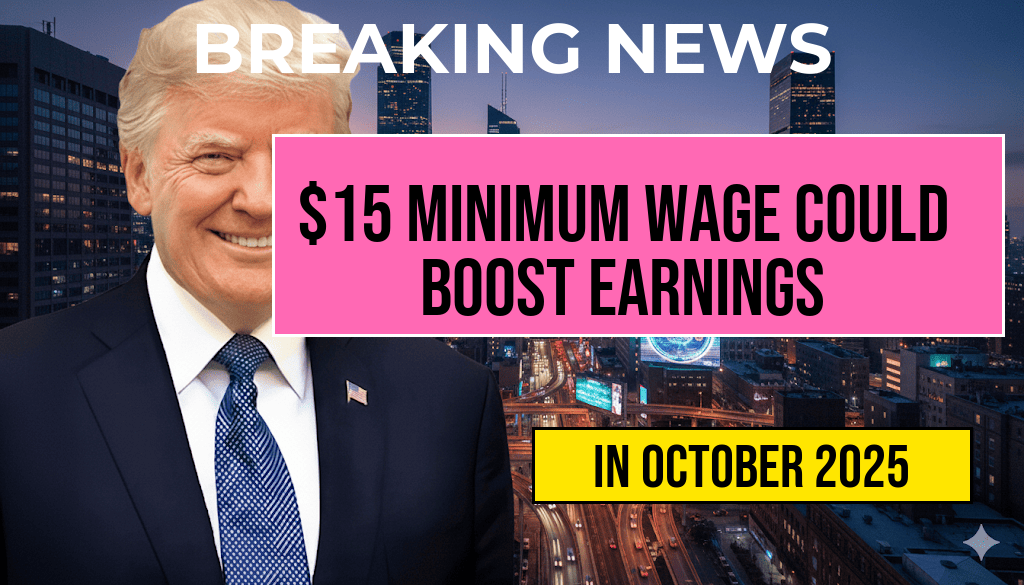A proposed increase in the federal minimum wage to $15 an hour could lead to a significant boost in earnings for millions of American workers. According to recent analyses, approximately 32 million employees could see their annual income rise by an average of $3,300. This change aims to address wage stagnation and income inequality, providing a substantial financial uplift for low-wage earners across diverse industries. While supporters argue that a higher minimum wage would stimulate economic activity and improve living standards, critics warn of potential impacts on employment levels and business costs. The debate continues as policymakers consider the implications of such a shift in federal wage policy, balancing economic growth with worker support.
Projected Economic Impact of Raising the Federal Minimum Wage
Who Would Benefit?
- Approximately 32 million workers currently earning near the minimum wage
- Workers in sectors such as retail, hospitality, and healthcare
- Individuals supporting families or paying high living costs in urban areas
Estimated Earnings Increase
| Number of Workers | Average Annual Increase per Worker | Total Additional Earnings |
|---|---|---|
| 32 million | $3,300 | $105.6 billion |
This analysis suggests that, collectively, low-wage workers could see a boost of over $105 billion in annual income, which may translate into increased consumer spending and economic activity. Such a rise could help bridge income gaps and enhance financial stability for many households.
Potential Benefits and Economic Considerations
Benefits for Workers and the Economy
- Increased disposable income for low-wage earners, leading to higher consumer spending
- Reduction in poverty and reliance on social safety net programs
- Potential decrease in employee turnover and increased workplace stability
Possible Challenges and Criticisms
- Risk of increased labor costs prompting some employers to reduce hiring or cut hours
- Small businesses facing higher wage bills may struggle to absorb costs
- Concerns over inflationary pressures in certain sectors
Historical Context and Policy Debates
The idea of raising the federal minimum wage has been a recurring topic within economic policy discussions. Previous attempts to increase wages have often faced opposition from business groups citing potential job losses. However, research from institutions like the Wikipedia indicates that moderate increases can be implemented with minimal negative employment effects. Several states and cities have already adopted higher minimum wages, providing real-world case studies on the outcomes of such policies.
Looking Ahead: Policy Proposals and Political Dynamics
Efforts to raise the federal minimum wage to $15 per hour have gained momentum, with legislation introduced in Congress and endorsements from various labor unions and advocacy groups. Supporters argue it’s a necessary step toward ensuring fair pay and economic fairness, especially amid rising living costs. Conversely, some policymakers and business associations advocate for a more phased approach or regional wage adjustments, emphasizing economic flexibility.
Comparative Analysis of State Minimum Wages
| State | Current Minimum Wage | Proposed Federal Minimum Wage |
|---|---|---|
| California | $15.50 | N/A |
| Florida | $11.00 | $15.00 |
| Texas | $7.25 | $15.00 |
As discussions continue, the federal minimum wage remains a contentious but central element of economic policy debates. The potential for millions of workers to see their annual earnings increase by thousands of dollars underscores the importance of this issue in shaping the future of the U.S. labor market.
For more insights on wage policy and economic impacts, resources such as Forbes and the Wikipedia page on minimum wage economics provide comprehensive analyses and updates.
Frequently Asked Questions
What is the proposed new federal minimum wage?
The proposed federal minimum wage is fifteen dollars per hour, which aims to increase earnings for millions of workers across the country.
How many workers could benefit from the increase to a $15 minimum wage?
Approximately thirty-two million workers could see an increase in their annual earnings if the minimum wage is raised to $15 an hour.
What is the estimated impact on annual earnings for workers?
The article estimates that raising the minimum wage to $15 could boost the average annual earnings of affected workers by about three thousand three hundred dollars.
Why is raising the minimum wage considered important?
Increasing the minimum wage is viewed as a way to improve living standards, reduce poverty, and promote economic growth for low-wage workers.
Are there potential economic benefits or concerns associated with this wage increase?
While the wage hike could lead to higher income for many workers, some concerns include potential impacts on business costs and employment levels. However, many studies suggest overall positive effects on worker well-being.






